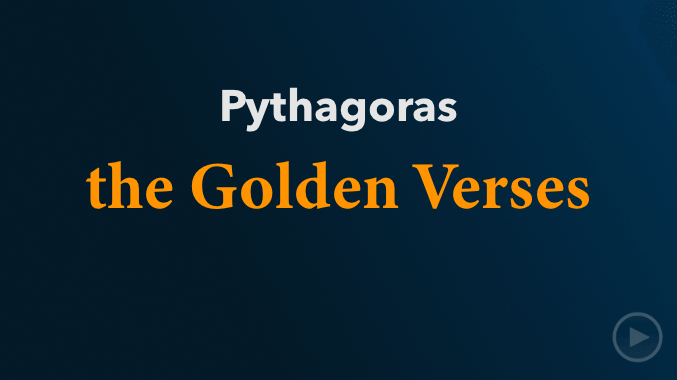• the Golden Verses •
• Pythagoras •

About the “Golden Verses" of Pythagoras
The "Golden Verses" (Gr.: Χρυσᾶ Ἔπη) of Pythagoras - or more correctly of the Pythagorean tradition, is a set of ethical teachings attributed to the ancient Greek philosopher and mathematician, instructing on principles for living a virtuous and harmonious life. These verses encourage a reverence for the divine, self-examination, and moderation in all aspects of life. Pythagoras extols the virtues of righteousness and ethical conduct, advocating for inner peace and tranquility, believing that a calm mind is essential for wise decision-making.
The verses also highlight the importance of selecting friends and companions wisely, associating with virtuous individuals who can contribute to personal development. They promote the pursuit of knowledge and wisdom through lifelong learning and emphasize the significance of careful and mindful speech to prevent misunderstandings and conflicts.
Humility, simplicity, and a reverence for nature are qualities praised by Pythagoras in the "Golden Verses." In summary, these teachings encapsulate his philosophy, which combines ethics, spirituality, and self-improvement, all underpinned by a fundamental emphasis on achieving harmony and balance in one's life.
You can follow an English translation of “the Golden Verses” by Pythagoras, online at sacred-texts.com.
The original Greek text can be found at Bibliotheca Augustana
about Pythagoras
Pythagoras (Gr.: Πυθαγόρας) born on the island of Samos (c. 570-495 BCE) was an ancient Greek philosopher, mathematician, and mystic. He is best known for his contributions to mathematics, particularly in the field of geometry and number theory. Pythagoras is famous for the Pythagorean theorem, which relates the lengths of the sides of a right triangle. This theorem is a fundamental concept in geometry.
Beyond mathematics, Pythagoras was a charismatic figure who founded a religious and philosophical movement known as Pythagoreanism. His followers, known as Pythagoreans, believed in a way of life that combined philosophy, ethics, and religious practices. They believed in the transmigration of souls (reincarnation) and followed strict rules, such as vegetarianism, and maintained a strong focus on the study of numbers and their mystical significance.
Pythagoras is also associated with the concept of harmony and the idea that the cosmos is ordered according to mathematical relationships. He made contributions to music theory, believing that the ratios of musical intervals could be expressed as numerical proportions.
Although Pythagoras himself left no written works, his ideas and teachings were transmitted through the writings of his followers. He had a profound influence on the development of mathematics, philosophy, and the broader intellectual traditions of ancient Greece. His legacy continues to influence these fields to this day.
About the audio~videobook
 The recording contains the complete, unabridged Ancient Greek text of the Pythagorean “Golden Verses”. The videobook shows the highlighted Greek text simultaneously with the reading.
After purchase you will be able to download the relevant file(s), containing the work in mp3 a/o mp4 format.
The recording contains the complete, unabridged Ancient Greek text of the Pythagorean “Golden Verses”. The videobook shows the highlighted Greek text simultaneously with the reading.
After purchase you will be able to download the relevant file(s), containing the work in mp3 a/o mp4 format.
The videobook comes with (optional) captions in English. Other languages on request.
You can listen to the first five lines of the Pythagorean “Golden Verses”, an audio sample of the present audiobook. Please, click on the play-button bellow and, if you wish, follow the Ancient Greek text lower on the page, or alternatively watch the video, which is provided with a quick translation in English. Thank you!
ΧΡΥΣΑ ΕΠΗ
Ἀθανάτους μὲν πρῶτα Θεοὺς, νόμῳ ὡς διάκεινται,
Τίμα· καὶ σέβου Ὅρκον· ἔπειθ᾿ Ἥρωας ἀγαυούς·
Τούς τε Καταχθονίoυς σέβε Δαίμονας ἔννομα ῥέζων.
Τούς τε γονεῖς τίμα, τούς τ᾿ ἄγχιστ’ ἐκγεγαῶτας.
Τῶν δ᾿ ἄλλων ἀρετῇ ποιεῦ φίλον ὅστις ἄριστος.
